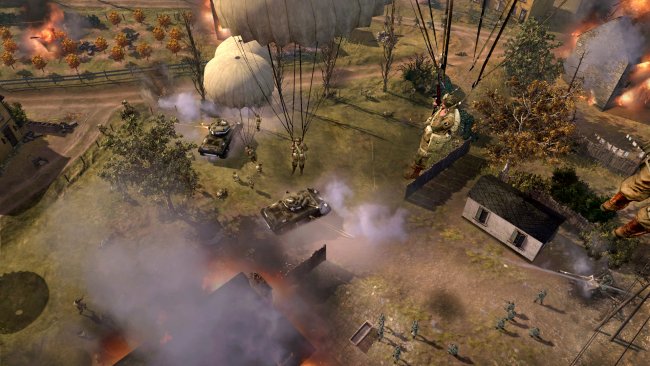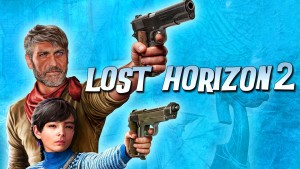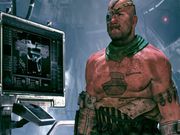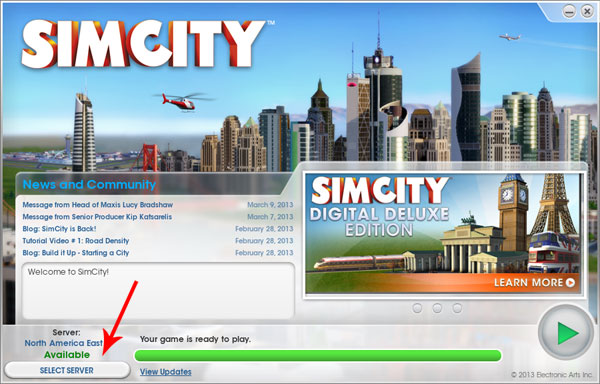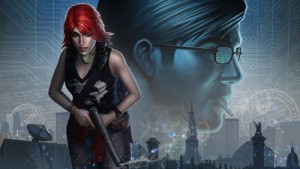

At the tail end of last week, Relic and Sega announced new content coming to last year's World War II RTS, Company of Heroes 2. Shortly after the announcement we sat down with Relic's Quinn Duffy and Greg Wilson, and found out more about what fans of the series can expect when the new armies roll out in CoH2 later this year.
So for people who haven't heard, what have you just announced?
Greg Wilson: So the big news is Company of Heroes 2 is back on the Western Front. So we're introducing the Western Front armies; US Forces and the Oberkommando West are being released as standalone content for the franchise. So there's new units, new abilities, new vehicles, new team weapons, new maps, everything on the Western Front. It's content that intermixes with the existing content so you can play it in custom games by yourself, with your friends if they've got it, or with the AI in practice, or you can go in the match pool and you'll actually get matched up against everybody that's playing, so you'll actually have a chance of playing on the Eastern Front maps, you can play with or against the Soviets or the East Germans, it just depends how they match up. So then you're part of the entire Company of Heroes 2 player-base, so you'll have the schedules for every improvement that we make to the game as part of that as well.
So why the focus on multiplayer over single-player content?
GW: For us, right now, we are using our instinct as developers and whatever feedback we could get from our customers to help [make] the decisions - now using those two but also adding telemetry into the mix and seeing how people are consuming our content and playing it. So we've got this sort of triad of pieces that help us make the decisions. The multiplayer community is by far the most engaged community for CoH2 and so we're feeding into that need. They've asked for the Western Front, they're playing the game more than ever, so we're delivering that content first.
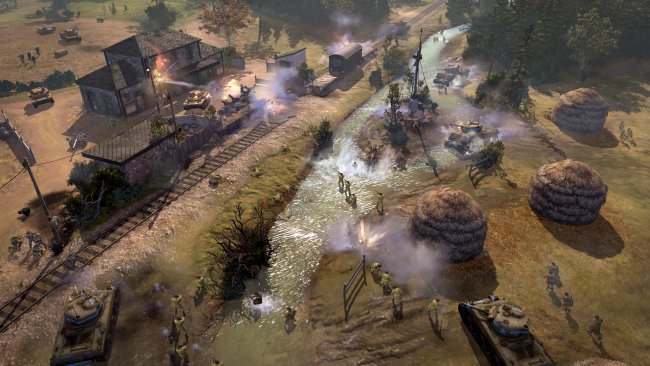
From a critical perspective, it could be argued that the Eastern Front armies didn't resonate as strongly as they did with the those from the original Company of Heroes. Is that why you're bringing them back?
Quinn Duffy: It was interesting when we were developing Company of Heroes, the number one thing people asked about was: "when was the Eastern Front coming up?" When we'd made the Eastern Front the number one question was: "when's the Western Front coming?" So it's fifty-fifty really, people want the history of the East, or they want the history of the West, depending on their preferences or their focus. I think the thing for us was finding a way to bring the Western Front back, support that community, some exciting things in terms of the army design, creating a real spectrum of armies for supporting players from a perspective of things they liked visually (some people love big, heavy German tanks, some people want to play with Americans because they're American). So there's different desires that we try to satisfy from a player perspective, whether it's gameplay, or whether it's about an aesthetic, or whether it's an army that they have a particular interest in. We knew from the get-go the plan that we roughly wanted to follow included Company of Heroes 2 as a World War II platform and Eastern Front/Western Front armies, just continuing to build on that experience and giving players an opportunity to try new content.
So all the different factions, new and old, will be able to play each other?
QD: Yes.
It must have been a nightmare to balance four different armies?
QD: Yeah, to a degree. It's a challenge. They're very different armies. We pride ourselves on asymmetry as a design goal, to give these players a really different experience. But what we've done is literally planning out the balance updates and patches for the existing Company of Heroes 2 armies in conjunction with how we're developing the Western Front armies, to get them ready to fight against each other. So there's some method to the madness in behind that. We have a lot more mature balancing systems now from a data standpoint, both in what we're learning from the players, in the game modes and the maps. That feeds into the balance and we can watch the impact - almost day-to-day - to the changes that we make, and also the tools that the balancers use themselves, the costs and efficacy of different units. So it's actually a lot easier than the first time around in the original Company of Heroes, when we did the same thing with four armies. This has been relatively painless from that perspective.
So you say you're tracking stats from the community, how has the way people play evolved since launch?
GW: A lot. We have always collected data on some level, we just didn't understand how to use it effectively. It wasn't because we didn't think it was important or we didn't try; we didn't have the right minds or dedicated set of people to really make that their goal to inform people how to use this and start the dialogue about it. In the past we had a programmer or a tester in their spare time pull some data down and we'd ask for a report, and they'd say: "here's the stuff that I can visualise for it". And it would be really service level things, and it was hard to get good dialogue around what it meant or how to make improvements, and you would go to someone and show it to them and maybe it didn't resonate with them, or maybe they didn't understand what it meant and they would leave it and go back to what they knew how to take care of. Now we have a team of data specialists. They sit in a team, they're passionate, they're excited and motivated to make sure that data makes sense for people. So they're always doing reports and visualising it in different ways, having meetings or talking to people, or asking questions: "would you be interested in how this, this and this are related to each other?" or "did you know that these three things are related, that we never knew were related, what do you think about this?" And the comments, and the sparks in eyes that happen, people are like: "I never even knew that... oh wow. I can go with that and make a change!" So it's evolved, not only in our understanding of how to use it, but how we apply it, significantly. And that's only been in the last twelve months.
QD: And you know the data set, the data in Company of Heroes, technically was so onerous, you know the storage, the impact on the server, we literally had to shut it on-off on-off, little bursts of data. Now we've collected; there's twenty million hours of gameplay and cloud storage. You can store this massive data set. In the old system you could run a query and you'd have to run it over the weekend, and the machine is chugging away trying to give you something and it spits out a piece of crap and you're like "oh, that's not right" and so it's three days wasted. Now these guys can run a query in this huge database and it takes literally seconds. So the ability to make a change, see the impact, and adjust to it, it's unprecedented for us.
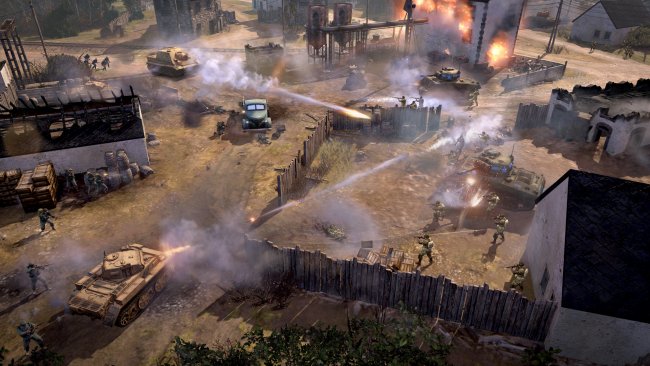
So how has that manifested in the game? What kind of changes have you made?
GW: So a big one, one of the reports that came up was about ungraceful network disconnects.
QD: That's a good way to put it.
GW: So people basically getting booted from the multiplayer game. And so this graph came up and showed us how much this was happening and it actually sparked a discussion that ended up in a rework of our entire networking client. And so we invented a technology that we're calling 'Battle Servers', and they're essentially relay servers that relay packets back and forth between different machines. But when you see the graph there was a drop, and that improved the experience for players; you don't get disconnected, you're in-game longer, you're having fun, it's a better experience for you. So that's one. Balance is another one, just this simple comparison of the gap between the two factions and how it changes with every update and balance tuning and new content and things that we add, it shows us the impact and it sparks the discussion and people get together and ask "what are we going to do about this, and are we ok? Do we know what's causing this?" And then we dig and it's like "oh, I didn't know we could do this by this timestamp in the game, did we intend this?" "actually no, this shouldn't be happening" "well how's this happening?" "well we found a bug that allows you to combine these things together and get something sooner than we intended". Then we fix it, push a patch out and get that right for players.
QD: I think we did nine updates in the first ten months of CoH. And then we've done eighteen, nineteen as of the 25th [for CoH2]. So that's content, updates, it's tuning changes, it's all that kind of stuff. And then we just watch the graph, and the graph just narrows down to getting it as close as we can humanly get to fifty-fifty balance. So it's an immediate cause and effect.
What other changes/improvements are coming with the next expansion?
GW: Another thing that's worth mentioning, in Company of Heroes 2, the sound design team saw there was an opportunity to up our game in terms of sound design for weapons, so we let them go out and do live weapon records in the desert in California. So they put microphones on every conceivable part of the weapon; the clip, the shells, the ground near it, the ground in the distance behind trees, in somebody's boot. They put them everywhere, and captured all these weapons firing, loading, and all the different mechanics. And then they came back to the studio and created a soundscape of these weapons profiles that is super-realistic, and really increases the presence of the weapons in the game, that really adds to the immersion, the reality, the realism of it. On the Western Front armies the guys said "we think we've got an opportunity here, we want to achieve this but with vehicles" and we told them to go for it. So we did the same for vehicles. We even rented a bunch of tanks and a farm, and we put microphones everywhere; on the intake manifold, on the exhaust, we've got them on the seat, on the gearbox, on the hatches, on the track, everywhere you could possibly imagine, and we've captured every creak and rattle and shake, and every whoosh of exhaust, and they've taken it back to the studio and created this sound profile of these vehicles that's menacing. They're just these huge gas-guzzling beasts and they come to life on the field. So for us it's exciting to take things that people think we're already doing well, and do them even better, and the sound I think is something to look forward to with the Western Front armies.
Slight change of subject. The first CoH was recently relaunched on Steam. What's the situation with that?
GW: So we were using a third-party networking system that got bought up by another company and they shut it down for public use. So we had a choice to make, either let it die and have no control over it, and all those players who have purchased and loved it and were playing it would not have that experience - or convert it and keep supporting it. Luckily Sega believed in the franchise and believed in the power of supporting products longterm, and we converted it over to Steam and we actually integrated our server technology for Company of Heroes 2 into Company of Heroes 1. We've got the same ‘Battle Servers' that are relaying packets, and we'll continue to support it and keep it up and running for people for as long as we can imagine.
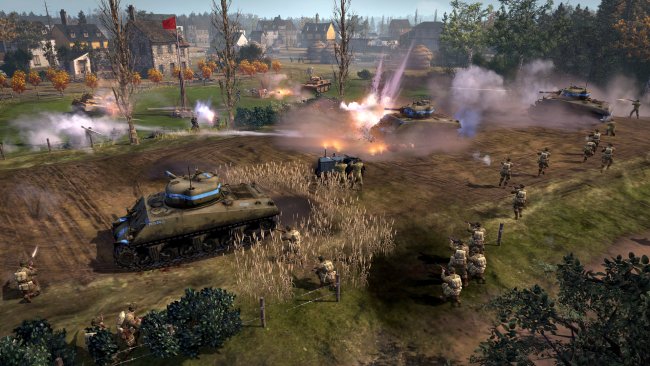
You've been onboard the good ship Sega for a while now. How's that changed the dynamic of the team and how are you using their strengths to push forward your company?
QD: There's been a remarkable difference I think. I think the way that Sega looks at the studio is providing the infrastructure of the team to have ownership over their decisions and how we develop. It's been a great partnership. I think what that has translated onto the team is morale boosting, because they feel they're empowered, that the team is making the decisions about moving forward, and day-to-day it's exciting to be working on that stuff. The chemistry is great - you know I don't want to sound fanboyish - but it really has made a remarkable difference, and I think there has been more changes in terms of ownership of the game, and the processes around building the game, in the last year than there's been in the last several years. Just in terms of getting together in groups and talking about the game and building features that everyone is excited to contribute. It makes a big, big difference.
So, hypothetically speaking of course, if you could take any Sega IP, or any IP you wanted, to make a new RTS, what would you go for?
GW: Wow... So there's a lot of sort of comical responses that are actually truthful. Like there could be a Sonic All-Stars RTS, that could be really interesting. But it's really what's true to us on a foundational level.
QD: What about one set in Rome? We could take Rome: Total War. [Laughter]
You could do a swap. They (Creative Assembly - also owned by Sega) could take the Second World War and you could takeover the age of antiquity.
GW: [After the laughter had subsided] I think it boils down to our passion for the details, and with Company of Heroes 2 we have the canvas to work with. And that's why we've got a team that's been around - the length of service for people at Relic, we've got over fifty percent of the studio that's been there for five years or longer, and some people as long as seventeen years. And there's people who love what they're doing and want to keep doing it, and that's what makes our games so great, it's because there's passionate people doing what they love, and that comes through in the quality of the product.
Obviously there's a love of history in there, with Company of Heroes, but there's also the Warhammer 40K license. Is science fiction another big passion for the team?
QD: We've got a great relationship with the Games Workshop guys. You know I personally love the military history stuff, but I worked on Space Marine and was immersed in the 40K lore. I can get excited about a lot of different things, personally, and you really get immersed in it when you're working on a game. When I was working on Space Marine I was reading 40K fiction, when I'm working on World War II games I read World War II books. I think people would love to be able to translate the kinds of games we build into... whether it's future or fantasy, the genre to me isn't as important as the tone or the vision of what you're trying to deliver. You know, we could do a Company of Heroes game any time, any place, I honestly believe that.
So what's the road ahead looking like for Company of Heroes?
GW: June 2014, this summer, for the new armies' release. Like Quinn said, we're looking to create, ultimately, a World War II platform for our fan base, and this is just another step in that direction. By June we'll be 12 months into the franchise, there's another two factions, and it's just going to open the doors for us.
So this is a platform to build on...
GW: Absolutely. We're behind the game 110% and so is Sega as well. The future for Company of Heroes is bright.
